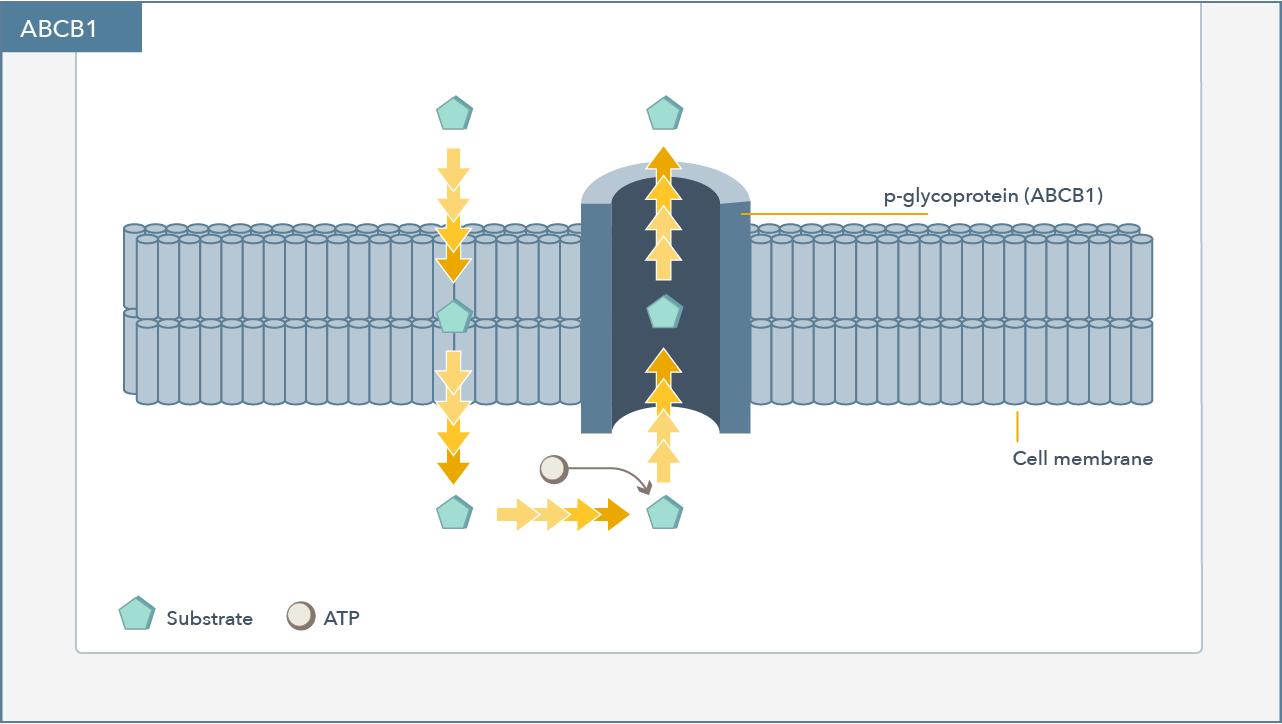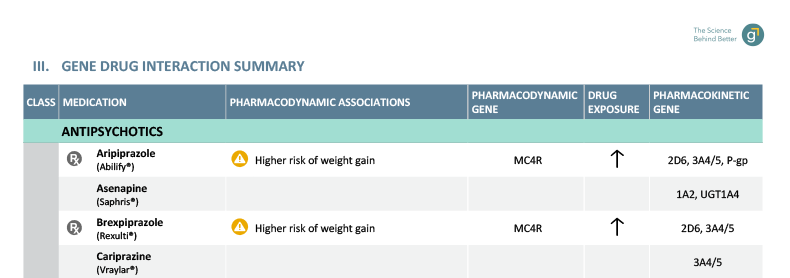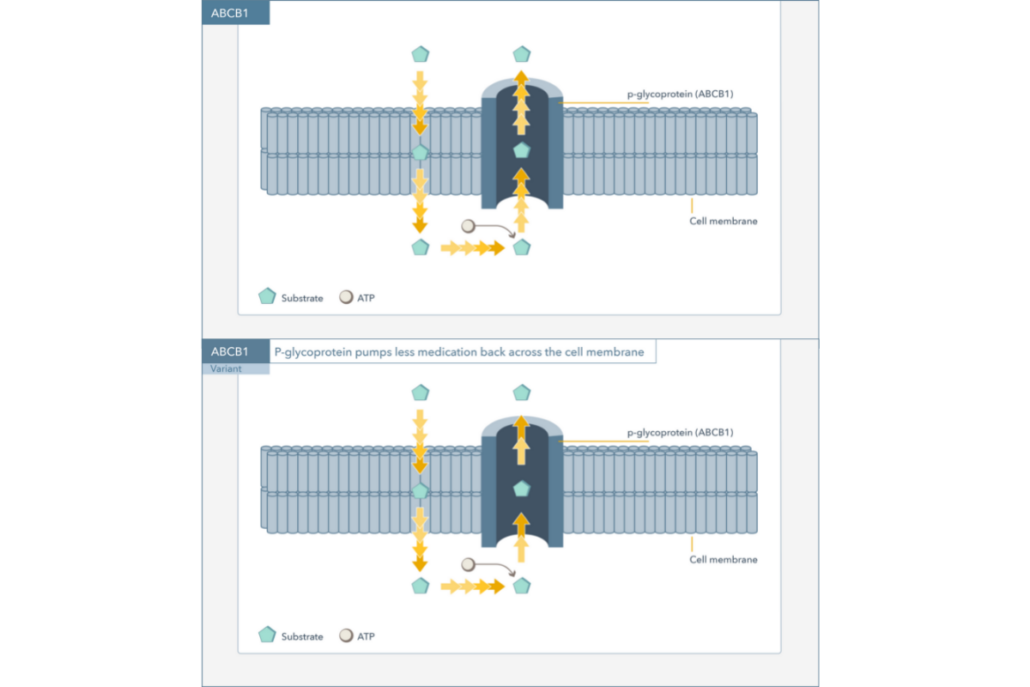What is the ABCB1 gene?
ABCB1 is short for ATP-binding cassette sub-family B member 1. As the name implies, ABCB1 is just one member of a superfamily of human ATP-binding cassette (ABC) transporters. The ABC genes encode transporter and channel proteins with membrane-spanning domains that form a pore. All eukaryotic ABC proteins function as efflux pumps and the translocation of substrates across the cell membrane is ATP-dependent.1
ABCB1 encodes the permeability glycoprotein, or P-glycoprotein (P-gp), an efflux pump that controls the transport of lipophilic, endogenous molecules and xenobiotics across important tissues such as the intestines and blood-brain barrier. P-gp is also sometimes referred to as multi-drug resistance protein 1 (MDR1 or MDRP1) in literature due to its influence on human exposure to several drugs, most notably some chemotherapeutic agents and antibiotics.1
What is P-glycoprotein (P-gp) and how does it work?
P-gp is expressed in specialized epithelial cells of secretory/excretory organs (liver, kidneys, small intestine) and in endothelial cells of capillary blood vessels at blood-tissue barriers, such as the blood-brain barrier or the placenta. As shown in Figure 1 below, the P-glycoprotein spans the cell membrane of the cells of the organ systems, and influences absorption, blood-brain-barrier penetration, and excretion of substrate drugs or other molecules.2

Figure 1
The ABCB1 gene is highly polymorphic which can lead to variations in P-gp expression or function, thus contributing to inter-individual variability of pharmacokinetics of substrate drugs.2 Certain ABCB1 genotypes have been associated with reduced activity of P-gp. In the context of psychiatric medications, only a handful of polymorphisms are associated with medication response or exposure. Genomind’s pharmacogenetic testing analyzes two variants in the ABCB1 gene (rs2032583 and rs1045642).
ABCB1 (rs2032583) A/G
A review by Brückl and Uhr sought to examine whether ABCB1 polymorphisms predicted clinical efficacy and/or tolerability of antidepressants with P-gp affinity. Rs2032583 was identified as one of the single nucleotide polymorphisms (SNPs) with the highest proportion of supporting evidence for an association with antidepressant response among Caucasians.6
A 2015 meta-analysis examined the association of rs2032583 variants and antidepressant treatment outcomes in a total of 2,037 patients with major depression. Results showed a nominally significant association of substrate treatment outcomes across all studies and a significant Bonferroni-corrected association among inpatients, demonstrating an association with antidepressant treatment outcomes..5 Additional studies have indicated that the G allele may be associated with an increased side effect burden to several antidepressants. However, individuals with this variant have also responded to lower doses, demonstrated higher remission rates, or responded faster than those without the variant, which corroborates the assumption that the G allele is associated with increased exposure to specific drugs.6
If an individual carries the rs2032583-G allele (A/G or G/G), that individual’s Genomind PGx report will include the following statement: This genotype is associated with increased exposure and side effect burden to several antidepressants.
ABCB1 (rs1045642) G/A
Also known as C3435T, this SNP is one of the most studied variants of ABCB1. The common variant has been associated with impaired function and/or expression of P-gp in vitro and in vivo.4 ABCB1 variants associated with lower P-gp function may predispose an individual to greater drug exposure within the CNS.
The heterozygous (G/A) genotype is associated with reduced activity of P-gp, but does not consistently impact drug exposure. Clinicians should be advised that there may be increased exposure to the following P-gp substrates:
- Antipsychotics
- Aripiprazole
- Clozapine
- Olanzapine
- Risperidone
The homozygous (A/A) genotype is associated with reduced activity of P-gp leading to increased absorption and exposure to the following P-gp substrates:
- Armodafinil and modafinil
- Antipsychotics
- Aripiprazole
- Clozapine
- Olanzapine
- Risperidone)
- Opioids
- Codeine
- Fentanyl
- Morphine
- Oxycodone
- Tramadol
- Phenytoin and fosphenytoin
- Topiramate
As shown in the example below, the Genomind PGx report highlights the drugs that are P-gp substrates. If the patient has a genetic variation in ABCB1, an upwards arrow in the drug exposure column will appear to reflect that there may be an increase in drug exposure.

P-Glycoprotein Drug-Drug Interactions and GenMedPro™
While the ABCB1 gene may impact treatment response and/or tolerability, it is important to recognize that numerous medications are substrates, inhibitors, and/or inducers of P-gp. Several commonly prescribed medications are P-gp inhibitors, including the macrolide antibiotics clarithromycin and erythromycin as well as the calcium channel blockers diltiazem and verapamil. Notable P-gp inducers include fosphenytoin, phenytoin, and St John’s Wort.
GenMedPro™, Genomind’s gene-drug drug-drug interaction tool, now captures these multifaceted interactions as of the latest update. GenMedPro™ is designed to assist clinicians with checking potential drug-drug and drug-gene interactions when prescribing medications sensitive to p-glycoprotein, CYP450, UGT, HLA-A 31:01, and HLA-B 15:02.
Are You Ready to Upgrade Your Practice with Genomind?
Genomind’s pharmacogenetic testing is the most advanced and comprehensive mental health pharmacogenetic test available. Get access to 26 genes related to mental health, 130+ medications, 10+ conditions, state-of-the-art tools, and 360 degrees of support. Register today!
References
- Hodges, L.M., et al., Very important pharmacogene summary: ABCB1 (MDR1, P-glycoprotein). Pharmacogenet Genomics, 2011. 21(3): p. 152-61.
- Saiz‐Rodríguez, M., et al. Effect of ABCB1 C3435T Polymorphism on Pharmacokinetics of Antipsychotics and Antidepressants. Basic Clin Pharmacol Toxicol, 2019. 123: 474-485.
- Amato, R.J., et al., Pharmacogenomics and Psychiatric Clinical Care. J Psychosoc Nurs Ment Health Serv, 2018. 56(1): p. 22-31.
- Beer, B., et al., Association of polymorphisms in pharmacogenetic candidate genes (OPRD1, GAL, ABCB1, OPRM1) with opioid dependence in European population: a case-control study. PLoS One, 2013. 8(9): p. e75359.
- Breitenstein, B., et al., ABCB1 gene variants and antidepressant treatment outcome: A meta-analysis. Am J Med Genet B Neuropsychiatr Genet, 2015. 168b(4): p. 274-83.
- Bruckl, T.M. and M. Uhr, ABCB1 genotyping in the treatment of depression. Pharmacogenomics, 2016. 17(18): p. 2039-2069.
